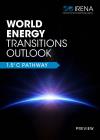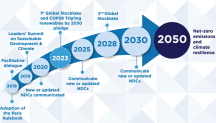
-
-
IRENA (2021), World Energy Transitions Outlook: 1.5°C Pathway, International Renewable Energy Agency, Abu Dhabi.
Copied
/-/media/Files/IRENA/Agency/Publication/2021/March/IRENA_World_Energy_Transitions_Outlook_2021.pdf?rev=67e7a4adee5140fab546f27d94d68dd7
Copied
World Energy Transitions Outlook: 1.5°C Pathway (Preview)
Newsletter
Download Executive Summary
Download Full Report or Read the Interactive Version
Download Slides
The Executive Summary is also available in in Arabic (عربي), Chinese (中文), French (Français), German (Deutsch), Italian (italiano), Japanese (日本語), Portuguese (Português), Russian (Русский) and Spanish (español).
The World Energy Transitions Outlook outlines a pathway for the world to achieve the Paris Agreement goals and halt the pace of climate change by transforming the global energy landscape. This report presents options to limit global temperature rise to 1.5°C and bring CO2 emissions to net zero by 2050, offering high-level insights on technology choices, investment needs, policy framework and the socio-economic impacts of achieving a sustainable, resilient and inclusive energy future.
This Outlook presents several prerequisites which underpin the theory of change behind IRENA’s 1.5°C Pathway.

IRENA’s analysis shows that over 90% of the solutions shaping a successful outcome in 2050 involve renewable energy through direct supply, electrification, energy efficiency, green hydrogen and bioenergy combined with carbon capture and storage (BECCS). Innovative solutions are reshaping the energy system. Yet, the necessary deployment levels at a speed compatible with 1.5C, will require targeted policies and measures.

Energy transition investment will have to increase by 30% over planned investment to a total of USD 131 trillion between now and 2050, yet will yield a cumulative payback of at least USD 61 trillion by 2050. Sharp adjustments in capital flows and a reorientation of investments are necessary to align energy with a positive economic and environmental trajectory.
A transformed energy sector will have 122 million jobs in 2050, renewable energy jobs alone will account for more than a third. A holistic global policy framework is needed to bring countries together to commit to a just transition that leaves no one behind and strengthens the international flow of finance, capacity and technologies.
Browse and read the interactive version.
Read A Steep Path to 1.5°C Needs Leadership.





